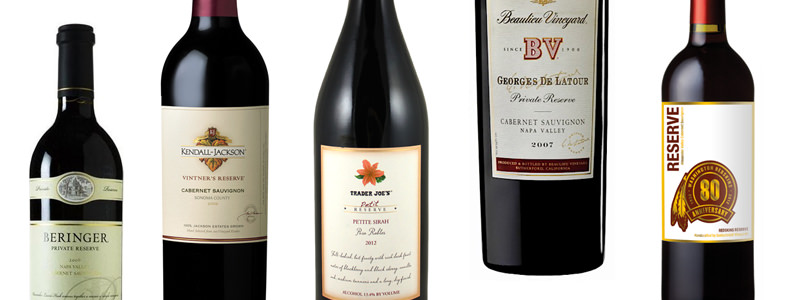Myth Busted – Calling A Wine “Reserve” Is Meaningless (original) (raw)
The word “reserve” on a bottle of wine has become one of the shadiest terms one can use when it comes to marketing wine. That’s because the word’s use has no regulation – except in Italy and Spain – and has different meanings depending on the winery and the region. Basically, reserve means whatever the marketer wants you to think it means.
The problem is, if you’re simply a casual wine consumer – which the majority of us are – you assume the word “reserve” should mean something, it should be an indication that the wine is a bit more special than the other bottles sitting on the shelf. You think perhaps this term “reserve” is reason enough for you to choose this wine over another. Doesn’t “reserve” mean better? Marketers know this, that’s why the word is printed on the bottle in the first place. But the term “reserve” wasn’t always a hollow descriptor simply used to sell more bottles of wine, it used to have real meaning. The question really is, how did we lose that?
Harkening back to the beginnings of wine labels, the term reserve used to be employed when a winemaker would hold back, or “reserve,” some of their wine in a year when they felt the wine was especially good. The wine they chose to select and hold as reserve may have come from grapes grown in an area of the vineyard the vintner considered more special than others, or out of certain barrels that seemed to be impacting the wine in different and more interesting ways. These wines would then be aged a bit longer and would emerge often tasting richer and more opulent than the regular release.
Don't Miss A Drop Get the latest in beer, wine, and cocktail culture sent straight to your inbox.
In two countries, Spain and Italy, this is still the case. The governments in both of these countries have strict regulations regarding what can and cannot be labeled a reserve wine, so when you see it on the bottle, you know it’s legit. In Chianti for example, a Chianti Reserva cannot be released until it is aged at least two years in the winery, a large aging difference from the seven months that Chianti Classico must age. So if you see a wine from Spain or Italy with the labeling of Reserve, Riserva or Reserva, you can rest easy that this does actually mean that the wine is a bit more special.
Fun Fact: Rioja’s Grand Riserva wines aren’t even released every year. These wines are typically only made in years the winemakers feel are extra special.
In the rest of the world, however, particularly the wine regions of the new world – places like Australia, New Zealand, Argentina, Chile, and the United States – the labeling of a wine as reserve is basically BS. Take Kendall Jackson’s Vintner’s Reserve for example – which has been cited frequently for how ridiculous the name is – the fact that the word reserve is on the bottle is meaningless. In fact, there isn’t a lower tiered wine below the Vintner’s Reserve at all, the Vintner’s Reserve is the only wine they make, so nothing has been reserved, it’s just marketing.
It’s important to point out that many wineries in the these new world regions do use the word “reserve” on their label for its intended purpose, but unfortunately, because there are no official guidelines – as there are in Spain and Italy – that the winery must follow in order to use the term reserve in their labeling, the safest bet is to assume the labeling is being used for marketing and marketing only.
In 2010 the TTB – the government organization that regulates U.S. wine labels – asked the public to weigh in on how they should categorize and regulate the term “reserve” along with other wine terms such as “barrel fermented,” “old vine,” and “proprietor’s blend.” After taking input from journalists, winegrowers and even foreign governments, a ruling was never made and the term was never classified at all, they left it undefined – for all intents and purposes the word reserve to the TTB is meaningless.
So don’t feel like you have to spend more money, or that you happen to be getting a better wine, just because it has the term reserve emblazoned on the label.
